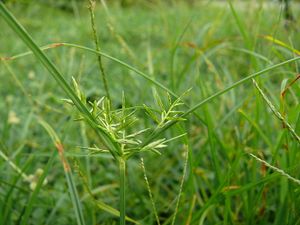Note: This is a project under development. The articles on this wiki are just being initiated and broadly incomplete. You can Help creating new pages.
Cyperus rotundus - Mustaka
Cyperus rotundus is a perennial plant that may reach a height of up to 140 cm. It prefers dry conditions, but will tolerate moist soils, and often grows in wastelands and in crop fields.
Contents
- 1 Uses
- 2 Parts Used
- 3 Chemical Composition
- 4 Common names
- 5 Properties
- 6 Habit
- 7 Identification
- 8 List of Ayurvedic medicine in which the herb is used
- 9 Where to get the saplings
- 10 Mode of Propagation
- 11 How to plant/cultivate
- 12 Commonly seen growing in areas
- 13 Photo Gallery
- 14 References
- 15 External Links
Uses
leprosy, thirst, fever, Curing liver disorders, blood diseases, biliousness, dysentery, pruritis.
Parts Used
Chemical Composition
Contains volatile oils, flavonoids, apigenin, luteolin, quercetin, kaempferol, tiliroside, triterpene glycosides including euscapic acid and tormentic acid, phenolic acids, and 3%–21% tannins[1]
Common names
| Language | Common name |
|---|---|
| Kannada | abdahullu, koranari-gadde |
| Hindi | Bara-nagar-motha |
| Malayalam | karimuttan |
| Tamil | korai, korai kilangu |
| Telugu | bhadra-tunga-muste |
| Marathi | NA |
| Gujarathi | NA |
| Punjabi | NA |
| Kashmiri | NA |
| Sanskrit | abhrabheda, ambhodhara |
| English | Common Nut Sedge |
Properties
Reference: Dravya - Substance, Rasa - Taste, Guna - Qualities, Veerya - Potency, Vipaka - Post-digesion effect, Karma - Pharmacological activity, Prabhava - Therepeutics.
Dravya
Rasa
Tikta (Bitter), Kashaya (Astringent), Katu (Pungent)
Guna
Laghu (Light), Ruksha (Dry)
Veerya
Sheeta (cold)
Vipaka
Katu (Pungent
Karma
Kapha, Pitta
Prabhava
Habit
Identification
Leaf
| Kind | Shape | Feature |
|---|---|---|
| Simple | alternate | Leaves sprout in ranks of three from the base of the plant |
Flower
| Type | Size | Color and composition | Stamen | More information |
|---|---|---|---|---|
| Bisexual | 2-4cm long | Yellow | 5-8 | Flowers Season is June - August |
Fruit
| Type | Size | Mass | Appearance | Seeds | More information |
|---|---|---|---|---|---|
| three-angled achene | 7–10 mm | The root system of a young plant initially forms white, fleshy rhizomes | fleshy rhizomes | many | {{{6}}} |
Other features
List of Ayurvedic medicine in which the herb is used
- Vishatinduka Taila as root juice extract
Where to get the saplings
Mode of Propagation
How to plant/cultivate
Prefers a moist sandy loam and a sunny position[3]
Commonly seen growing in areas
Roadsides, sandy fields, cultivated ground, damp places.
Photo Gallery
References
External Links
- Ayurvedic Herbs known to be helpful to treat leprosy
- Ayurvedic Herbs known to be helpful to treat thirst
- Ayurvedic Herbs known to be helpful to treat fever
- Ayurvedic Herbs known to be helpful to treat Curing liver disorders
- Ayurvedic Herbs known to be helpful to treat blood diseases
- Ayurvedic Herbs known to be helpful to treat biliousness
- Ayurvedic Herbs known to be helpful to treat dysentery
- Ayurvedic Herbs known to be helpful to treat pruritis
- Herbs with Roots used in medicine
- Herbs with Seeds used in medicine
- Herbs with common name in Kannada
- Herbs with common name in Hindi
- Herbs with common name in Malayalam
- Herbs with common name in Tamil
- Herbs with common name in Telugu
- Herbs with common name in Sanskrit
- Herbs with common name in English
- Habit - Perennial plant
- Index of Plants which can be propagated by Seeds
- Index of Plants which can be propagated by Cuttings
- Herbs that are commonly seen in the region of Roadsides
- Herbs that are commonly seen in the region of sandy fields
- Herbs that are commonly seen in the region of cultivated ground
- Herbs that are commonly seen in the region of damp places
- Herbs



